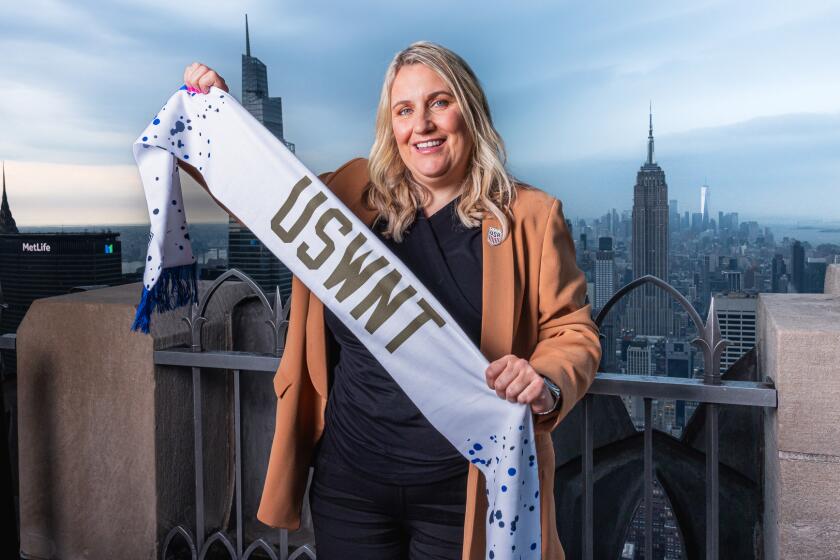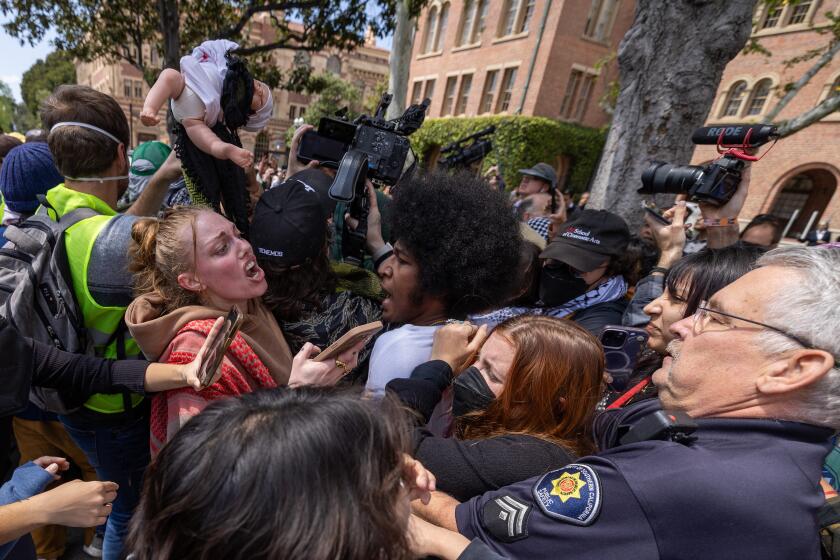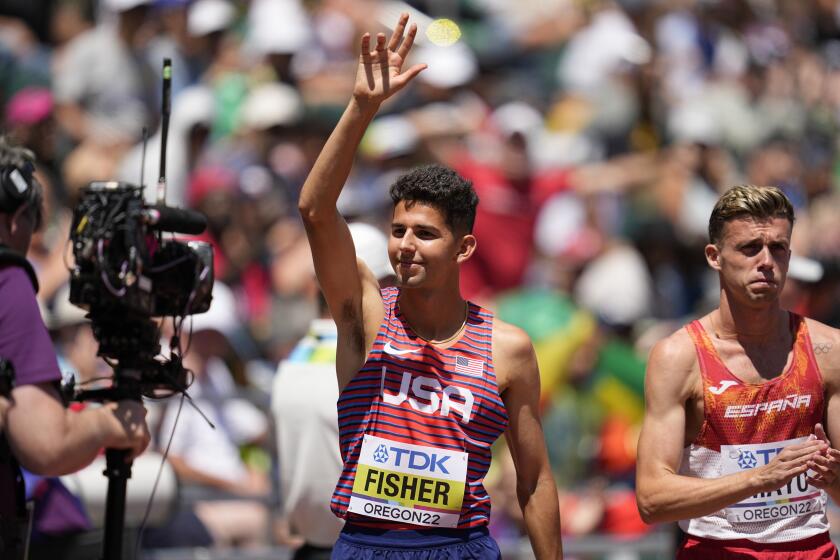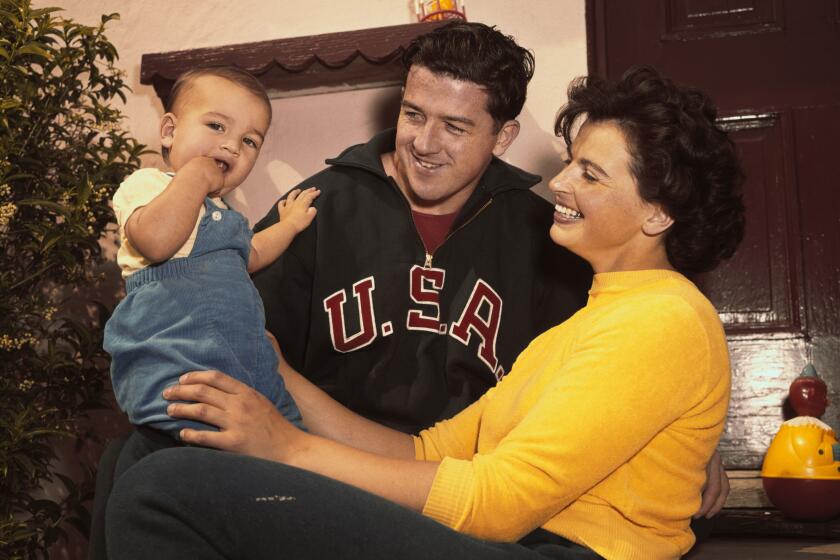OVER THE HUMP : Kingdom Did a Disappearing Act, but He Has Health and Form Back
Seeing Roger Kingdom two years ago, gasping for breath, unable to complete the most basic workout, it was hard to believe he was the 1984 Olympic 110-meter hurdles champion.
His right arm flailed wildly that spring evening in Pittsburgh. He slowed noticeably as he neared the halfway point in his set of 10 hurdles. By the seventh hurdle, exhausted and discouraged, Kingdom slid around it and stopped.
His workout was over. Some might have thought his track career was, too.
“It was to the point, Roger was beginning to think about the real world,” said Elbert Kennedy, his longtime coach. “You know, getting a job.”
A persistent left hamstring injury was his problem. Kingdom suffered it during a meet at Nice, France, in July of 1985. But for more than a year, he failed to realize the seriousness of injury.
He says he rushed his comeback, neglected his therapy and endangered his track career.
“I was marking time,” Kingdom said. “I wasn’t training. I didn’t get the type of treatment I needed. I wasn’t sincere with my rehabilitation. I would try stretching out, feel some pain and stop.
“I was somewhat burned out, and I didn’t face the fact I had a motivational problem. I just lost all motivation. It wasn’t any fun any more.”
For the better part of 2 1/2 years, Kingdom struggled with himself. Several times he tried to come back, only to fail and return to his training base in Pittsburgh.
“I’m sure Greg Foster, Tonie Campbell and all of them thought Roger was done with hurdles,” said John Vasvary, his former coach at the University of Pittsburgh. “Well, Roger has news for them: He is back. And I’m sure he has surprised a few of them.”
Kingdom emphasized that message last Friday in The Athletics Congress’ USA/Mobil championships at Tampa, Fla. He not only won his first national championship race since 1985, defeating Campbell, but his time of 13.15 seconds was the fastest in the world since he ran his personal best of 13.14 at Modesto three years ago.
Kingdom, who has yet to lose in six races this season, will put his streak to its next test Saturday in the Michelob Invitational at San Diego’s Balboa Stadium. It will be the second 1988 outdoor meeting between Kingdom and Foster. Foster got his first look at the rejuvenated Kingdom June 5, when Kingdom came from behind over the last three hurdles and won in the Pepsi Invitational at UCLA.
All that is missing from this last important U.S. meet before the Olympic Trials next month at Indianapolis is Renaldo Nehemiah, the world record-holder. Nehemiah was scheduled to compete but he withdrew three weeks ago after straining a hamstring in training.
Kingdom’s timing could hardly have been better. With the Olympics at Seoul less than three months away, he is running as fast as ever.
“It’s like Roger came down out of the hills, where he had been hiding for a long time,” Kennedy said. “The other hurdlers must be asking, ‘Where has he been all this time.?’ ”
Try Pittsburgh, hardly the track capital of America.
The winters are long and cold. Indoor training facilities are almost nonexistent. The terrain is hilly. And as for a track and field tradition, Kingdom was the first gold medalist from Pittsburgh since Johnny Woodruff won the 800 meters in the 1936 Olympics at Berlin.
Maybe that is why it has served Kingdom so well.
Living in Pittsburgh has kept him out of the track and field mainstream. It has provided him with a sanctuary to rest and recover from his post-Olympic failures without being watched by the inquisitive eyes of other world-class hurdlers.
Kingdom grew up in the rural Georgia town of Vienna. He went to the University of Pittsburgh on a football scholarship in 1981. He split time between the sports until shortly after the Olympics, when he put his football career and his college education on hold. But Kingdom chose to remain in Pittsburgh.
The city offers few reminders of his Olympic glory. The Los Angeles Coliseum is nearly 3,000 miles away, along with Foster and Campbell. Even his Olympic gold medal is far away in Georgia, locked in a safe deposit box, under his mother’s care.
“As soon as I got off the victory stand, I hung it on her neck,” Kingdom said. “Then my girlfriend tried it on. After that, my mother took it back. She said ‘This one is mine. You have all felt it around your neck. Now I’m going take it home.’
“Every once in a blue moon I get down there to take at a look at it,” Kingdom said, laughing. “Other than that, all I’ve got is a big 8-by-10 picture on my wall to look at.”
Kingdom said he thought about moving to a warm-weather site, possibly Florida, that might be easier on his hamstring, but he has rejected that idea.
“Being in Pittsburgh is an advantage,” he said. “I made my comeback without anyone knowing what I was up to. The other hurdlers have to be wondering: ‘What is Roger doing? What kind of training did he go through?’ People are questioning how did I come back so fast. All of a sudden out West they see Roger running well. It must be a real shock to them.”
Actually, the word on Kingdom has been out since he made his 1988 outdoor debut at Miami April 2, when he ran 13.49 into a strong head wind.
His race last weekend at Tampa was only the latest evidence that Kingdom is moving into position to become the only man other than American Lee Calhoun, who did it in 1956 and ‘60, to repeat as Olympic 110-meter champion. And to listen to Kingdom, his time could have been better had he not given up at near the end of the race.
“I hit the eighth hurdle and that threw me,” he said. “I clipped the the ninth and lost all momentum. The last three hurdles, I just shut it down. I slowed up.
“When I heard 13.15, I was really shocked. I couldn’t believe it. I was mad at myself for shutting it down. It could have been a PR (personal record).”
Instead Kingdom settled for proof that despite the last two seasons, he has missed nothing in his competitive absence. He fears little from the current group of top U.S. hurdlers that also include Arthur Blake of Florida State.
“I wasn’t worried because none of those guys were running my time (13.14) from ‘85,” Kingdom said. “You can look at all the races from ‘85, ‘86, ’87 and ‘88, and I’m the only person who has run that fast. No one has been close to my time, and (last) weekend clarifies my point.”
The fastest time other than by Kingdom since 1985 was a 13.17 by Foster last year.
Kingdom’s recent success has allowed him once again to get into the verbal fray that has characterized recent hurdles competition in the hurdles. Before Nehemiah temporarily forsook track for football, he and Foster had a running feud. More recently, it has been Campbell and Foster.
But while all of this was going on, Kingdom could only hold his tongue.
He has had to listen as Foster explained that his Olympic loss was the result of his hesitation after the gun because he thought there was a false start.
Never a strong indoor runner, Kingdom showed up at races in marginal shape and fared poorly. Sometimes the results were embarrassing. He was eliminated in the first round of the 55-meter hurdles at the 1987 U.S. indoor meet and finished last in a six-man field in the Millrose Games in January.
But the real problem was that Kingdom did little better outdoors. From the time of his injury until this spring, Kingdom never broke 13.40.
His frustration grew. His pride hurt. He reacted at times as he should--by working to get back in shape. But far too often, he turned the other way--neglecting his training.
His problems put a strain on his relationship with Kennedy, who coached him through his Olympic period, and they split. They have only recently been reunited.
Kingdom also was set back by the loss of his training partner, Clinton Davis, a promising high school runner who won the national indoor 440-yard dash title in 1983 and 1984. Davis broke both his legs in a car accident in 1985 and has been unable to run since.
But Kingdom’s most difficult time was when his maternal grandfather, Matt Wallace, was diagnosed as having cancer last June. He died in January.
Although Wallace had never seen Kingdom run in person, Kingdom said Wallace had given him that extra push, an incentive that the sometimes less-than-disciplined Kingdom needed most.
“He was the backbone of the family,” Kingdom said. “He would tell me right up front that I was screwing up. He would tell you when you were doing good, but he would get on you when you weren’t. I needed that, and I missed that.”
After his grandfather’s death, Kingdom said he began to wholeheartedly rededicate himself to hurdling.
His complacency was shaken in September, when Kingdom watched Foster win his second world championship in Rome. Kingdom did not even attempt to qualify for the event, withdrawing from the U.S. championships after learning of his grandfather’s illness.
Viewing the race on television, Kingdom felt oddly left out of the sport. Track was living without Kingdom, but Kingdom was rapidly learning that he could not live without track.
“From then until the end of November, I was at about my lowest point,” Kingdom said. “I believed in myself, but the pain I was facing, what I had to go through to come back was too much. Everything just hit rock bottom. That frustration and anger threw me down and there was nowhere I could go but up.”
Kingdom said he was mistaken in underestimating the degree of the injury to his left leg and the time and work it would take to recover.
“I didn’t think it was that serious,” he said. “I injured it in a trial heat. It was just a pinch, like someone stuck a pin in there. I tried to run in the finals and that is when I really tore it. After the third hurdle, it was a lightning bolt of pain.
“But it wasn’t until the next year (1986) that I realized how bad it was.”
Still, he could not discipline himself to undergo the massage and other muscle therapy he needed on a regular basis, explaining simply: “When it comes down to training, I don’t like getting up early in the morning.”
Financially, Kingdom said he never struggled. He drives an imported sports car and lives in a comfortable apartment in the Pittsburgh suburb of Monroeville. But to maintain that standard, he found himself tapping the money he saved before the injury.
“For 2 1/2 years, I lived off the good years,” Kingdom said. “I was making good money, but it wasn’t a quarter of what I was making during those years.”
It took the pressure of another Olympic year for Kingdom to realize he could not live off of his old money and gold-medal reputation forever.
He began making those twice-a-day trips for treatment, including the early morning sessions. After working for months on his own, he renewed his coaching relationship with Kennedy. And he became serious about his training again.
“Before, I would go to practices with Roger and he’d work for 5 minutes, talk for 20 minutes,” Kennedy said. “He just wasn’t motivated. But (now) when it’s time to get serious, Roger gets to work. He is a money runner, and this is money time.”
Go beyond the scoreboard
Get the latest on L.A.'s teams in the daily Sports Report newsletter.
You may occasionally receive promotional content from the Los Angeles Times.



